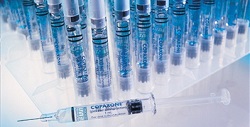 |
| FiercePharma file photo |
Teva is on a mission. The goal: switch as many multiple sclerosis patients as possible over to the new version of Copaxone before the current product loses patent protection in May. So far, Teva ($TEVA) has reached 85,000 of them; to do so, Bloomberg reports, the company has started emailing patients registered with its 24-hour patient-support hotline.
"Our records show that you may be a candidate for this new treatment option," read one promotional email seen by Bloomberg. "Talk to your healthcare provider."
As the company told the news service in an emailed statement, it's "encouraged by the response to date." But it may take more to convince payers.
It's a high-stakes race for the Petah Tikva, Israel-based company, for which Copaxone nets $4.3 billion in yearly revenue and accounts for more than 50% of profits--and payers know that, too. "Some payers are viewing this as Teva's strategy to avoid losing patients, and they may take an aggressive stance," consultant Gary Owens told Bloomberg. "It's going to be a wrestling match between two 500-pound gorillas."
Payers have been exercising more control as of late; pharmacy benefits manager (PBM) Express Scripts ($ESRX) made headlines last year when it excluded some of Big Pharma's hottest up-and-comers--like Novo Nordisk's ($NVO) diabetes med Victoza--and new growth prospects--like the brand new Breo Ellipta from GlaxoSmithKline ($GSK)--from its 2014 national preferred formulary. PBMs are demanding that drugmakers make a case for their high-priced new drugs over cheaper alternatives--Teva included.
"Express Scripts and our independent Pharmacy and Therapeutics Committee will perform a thorough evaluation of the clinical profile of the new Copaxone formulation and assess how the associated health outcomes compare to those of other treatments already on the market," Express Scripts spokesman David Whitrap told FiercePharmaMarketing in an emailed statement.
But with a sticker price of $60,500, the new version of Copaxone provides neither a low-cost option nor a clinical advantage over its predecessor, some figure. And as Express Scripts president Steve Miller told Bloomberg in December in reference to a pricey new generation of hep C drugs, if a company believes convenient dosing will be enough to win favorable reimbursement, "they may end up being disappointed."
That's essentially what David Lassen of Prime Therapeutics told Bloomberg. "We are going to assess first of all if this agent, relative to the daily agent, offers a significant clinical advantage," said Lassen, chief clinical officer of the PBM. "And by that I mean any safety or efficacy uniqueness that will offer a true clinical outcome advantage versus the daily drug."
And if Teva does intend to bank on the new Copaxone's more convenient dosing schedule, it will also have to contend with a handful of new oral treatments, including Biogen Idec's ($BIIB) soaring Tecfidera. The pill had one of the best launches of last year, generating 2013 sales of $876 million after hitting the market in April. With the impact of rival branded meds and generics combined, analysts expect Copaxone's sales to tumble 56% by 2016, Bloomberg notes.
Pricing for the new Copaxone could fall with them. The sales decline will spur Teva to the negotiating table with insurance companies, Joseph Sinopoli, president of reimbursement and consulting services company PreLaunch Strategy, told the news service. Generics could turn up at 20% cheaper than the original, at which point "Teva is going to be cutting deals."
- get more from Bloomberg
Special Reports: Top 10 Drug Patent Losses of 2014 - Copaxone | Top 10 Generics Makers by 2012 Revenue - Teva | Top 15 Drug Launch Superstars - Tecfidera - Biogen Idec